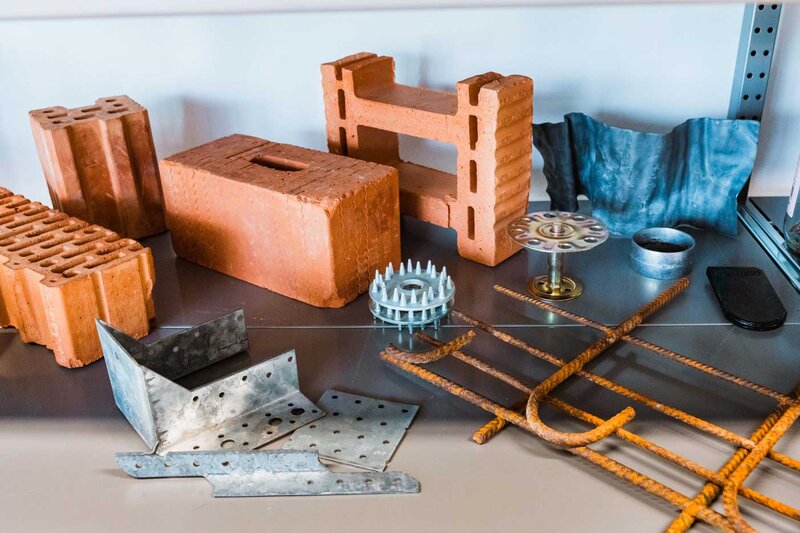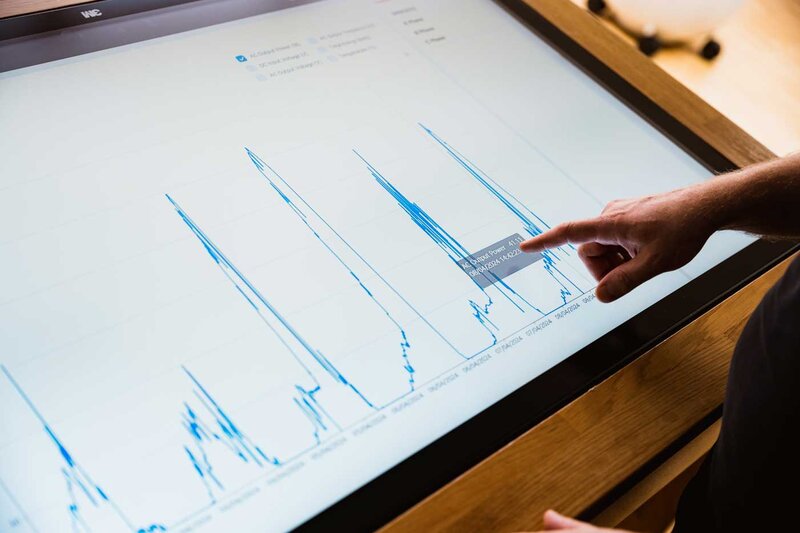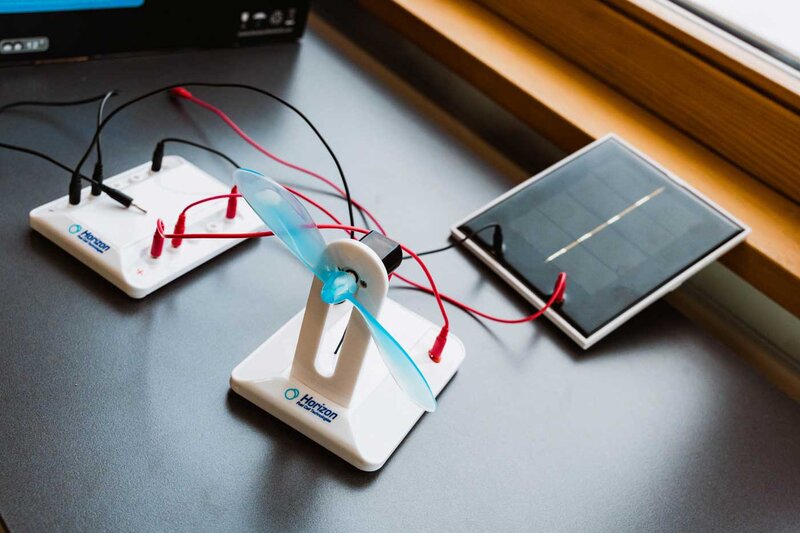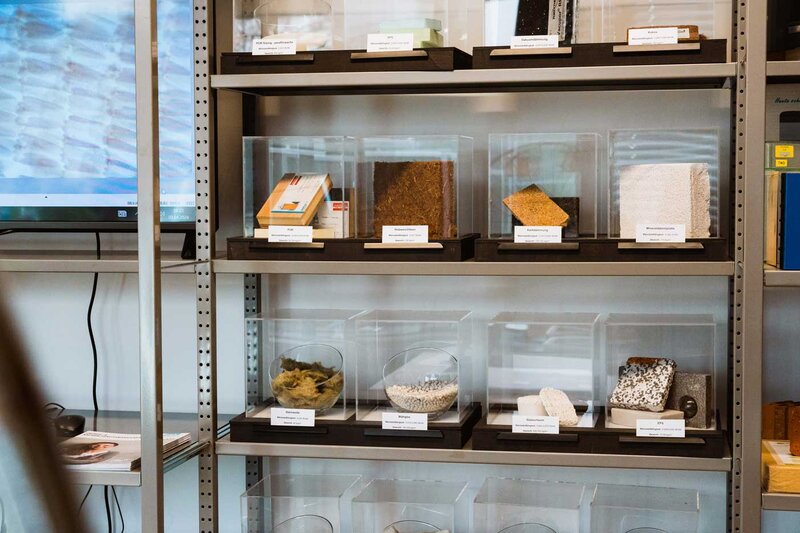Our part-time master's degree program in Facility & Real Estate Management provides you with the skills to excel in planning and management or even start your own business. Develop innovative, sustainable solutions and shape the future of the industry!

Facility & Real Estate Management
Master's degree program
Overview
-
Qualification Level:
Stufe 2, Master -
Price:
Euro 363,36* (excl. Student Union-fees) each semester -
Academic Degree:
Master of Arts in Business (MA) -
Academic Program:
Part-time -
Language:
80 % German, 20 % English -
Remote Options:
E-Learning max. 50 % online -
Exchange Semester:
Supervised study trip in the 4th semester** -
Admission Requirements:
General admission requirement -
Study Places per Year:
25
Study program accredited by the Agency for Quality Assurance and Accreditation Austria
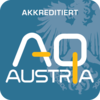
Program Description
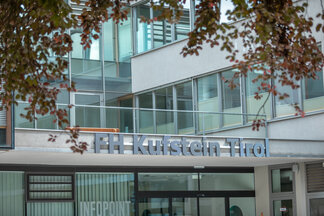


Expand your expertise in strategic real estate management by deepening your knowledge of economics, social sciences, communications, construction, and architecture. With study sessions on Fridays and Saturdays, the program offers a flexible schedule that allows you to effectively balance your studies, career, and family life.
The master's program offers in-depth specialization in real estate management, equipping students to tackle complex challenges through interdisciplinary approaches. Students learn to evaluate complicated portfolios, apply strategic management, communicate effectively, and conduct AI-based data analysis. Electives allow them to customize their focus. The master's thesis contributes to scholarly research while maintaining strong practical relevance. Regular fireside chats and project work foster professional networking. Graduates refine their foundational skills and develop a comprehensive understanding of strategic real estate management, preparing them for leadership roles and entrepreneurial ventures.
Study Focus
-
35 %
Technological knowledge in the real estate sector
-
35 %
strategic skills & management
-
30 %
Communication, practice & research transfer
What You Will Learn
-
Strategic development & management of real estate and service providers
-
Analysis and assessment of real estate portfolios
-
Management of complex real estate projects
-
Strategic communication with various stakeholders
-
Analysis of sustainability & development of targets in real estate asset classes
Popular Occupational Fields
- Real estate development & project management
- Real estate brokerage & utilization
- Real estate portfolio management & controlling
- Strategic management & optimization of building operations
- Corporate & Public Real Estate Management
- Property valuation
- Energy & Sustainability Management
Career Opportunities
-
EUR 50,500 (Austria) / 48,000 (Germany) average salary
for facility managers in Austria in 2024 (according to Kununu)
-
EUR 45,500 (Austria) / 41,100 (Germany) average salary
for property managers in Austria in 2024 (according to Kununu)
-
+ 6.2 % growth
in the global facility management market in 2023 (according to PWC, RealFM, Builtworld)
-
Significant business success
through effective facility management (according to PWC, RealFM, Builtworld)
The path to the Master's degree
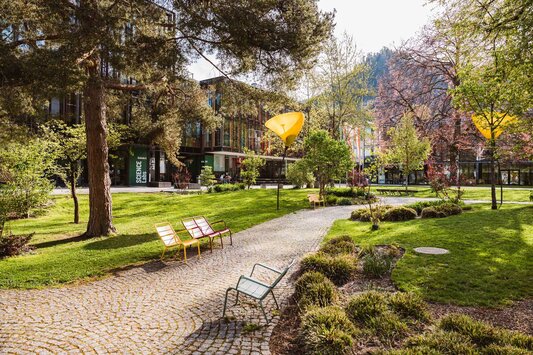
The Master's degree in Facility & Real Estate Management focuses on strategic management and interdisciplinary networking. The curriculum covers real estate economics, facility management, and strategic management. In later semesters, students dive deeper into real estate development, data analysis, and communication. Compulsory electives and the master's thesis provide opportunities for further specialization, allowing students to tailor their studies to their professional goals.
Special features:
-
Strategic specialization in the real estate sector with many years of international expertise
-
Large network & business contacts
-
Personal supervision by lecturers and the degree program team
Recognition of Prior Learning
Students have the option to receive credit for skills and competencies they have already acquired before the start of each semester.
To apply for credit, they must submit a request directly to the Director of Studies.
Director of Studies
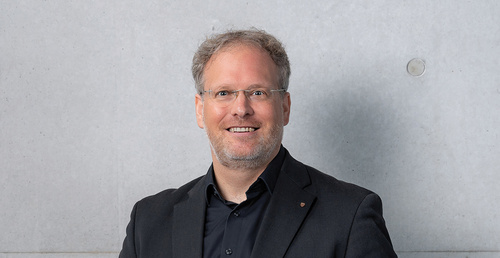
Asc. Prof. (FH) Dipl.-Ing. Christian Huber
Director of Studies Bachelor & Master Energy & Sustainability Management, Facility & Real Estate Management | Institute for Sustain & Estate
Curriculum
Empirical methods and academic methods
• research practice and fact-based decisions
• qualitative and quantitative methods, research design and forms of data collection (e.g. interview, questionnaire, observation, field and laboratory study, experiment, simulation)
• basics exposé for the Master thesis
Data Analysis
• univariate and multivariate data analysis
• predictive statistical data analysis (Machine Learning) and methodology of inferential statistics
• probability theory, information theory, Bayes Theorem
• system dynamics and agenda-based modelling
• application of methods of data analysis
• presentation and visualization of data
The students are able to:
• Independently identify problems and tasks from a given objective
•- Independently collect and analyze data
• Independently develop solutions and present results
• Independently develop specialist knowledge to solve specific problems and implement specialist knowledge in a situation-specific manner
Examples and approaches from practice and research will be presented in lectures by experts as well as excursions to companies and research institutions. The students analyze and reflect on the presented input. The students transfer research findings in an exemplary manner for specific practical applications. Methods of research are discussed for problems from practice.
Students must independently complete a Master thesis of 20 ECTS = 500 h. Regular meetings to discuss the current status and progress of the Master thesis with the accompanying academic supervision serve as support.
In the context of a colloquium with the scope of 2 ECTS = 50h, the following course contents are dealt with:
• Independent preparation and elaboration of an interdisciplinary subject
• Finding and substantiation of the methodology
• Content-related and organizational support for the preparation of the Master thesis
• Presenting and defending academic papers
• Leading discussions on academic papers
• Information on the final Master's examination
The preparation for the final examination is included with 2 ECTS = 50h.
One blocked compact weeks in small groups with international students:
• Introduction, consolidation, background and examples in the complex of topics of the project within the framework of a conference or introductory event.
• Research and analysis of framework conditions and possibilities
• Development and visualization of ideas and concepts
• Presentation of the results to stakeholders and/or technical experts
Students must complete an accompanied study trip / trip abroad with a specialist program. Within the scope of the study trip / trip abroad, the following contents are taught:
• Introduction and consolidation of international Best - and Real Case projects from the Facility and Real Estate Man-agement practice as well as studies from research
• Current topics of research and development by participation in international conferences
• Research and analysis of international Best Case projects for Facility and Real Estate Management
• Visit of international Best Case projects for Facility and Real Estate Management
• Application of intercultural skills and highlighting of particularities and challenges of intercultural projects for Facility and Real Estate Management
Facility Management
• Definitions and international perspectives
• Processes and quality management
• User/customer satisfaction
• Benchmarking
• Computer-aided facility management
Basics of legal relationships in facility management (rights and standards)
• Tendering of services
• Specifications: Service Level Agreements and Key Performance Indicators
• Operator responsibility and building operation
Technical building management
• Comfort criteria
• Maintenance strategies
• Energy management/ contracting
• Heating, ventilation, air conditioning, transport, electrical and sanitary engineering
Infrastructural building management
• Cleaning management
• Relocation management incl. space management
• Project organization and performance profiles
• Cost, schedule and quality planning
• Planning phases and contents
• Contracts and claim management
• Construction defects and structural damage
• Tools of project management or object planning (BIM)
• Actors and framework conditions in real estate project development, stakeholder analyses
• Application-oriented exercises on location analysis and utilization under building law
• Application-oriented exercises on building structure, space efficiency and space optimization
• Profitability analyses in real estate project development and risk analyses
• Working on a comprehensive practice-oriented task
• Selected special topics depending on the respective practice project
• Occupational health and safety
o Workplace design and evaluation
o Dangerous working materials
o Rights and duties of employees and employers
o Tasks (focus on safety) of preventive services,
Safety officers and works council
• Fire protection
• Perimeter security and burglary protection
• Risk analyses and business continuity management
• Property security checks
• Security concepts
• Social aspects of mobility
• Infrastructure for sustainable mobility
• Economic and strategic implementation
• Analysis of international and national mobility projects
• Exemplary development of sustainable mobility concepts
• Requirements for a sustainable building in the planning and construction process as well as in operation
• Life cycle analyses
• National and international certification systems
• Ecological, economic and socio-cultural sustainability criteria in relation to buildings (e.g. flexibility and conversion capability)
• Requirements of building services engineering for building clusters and special properties
• Networked building services engineering
• Basics of thermal and energetic building and building services engineering simulation
• Simulation software
• Comparison of static and dynamic consideration
• Strategic Business Management
o strategic pyramid (mission, vision and mission statement, goals, strategies) o strategic models, decision theories and competitive strategies
o tools of strategic analysis and planning (e.g. SWOT, portfolio analysis)
• Human Resource Management
o tasks of human resources work and personnel planning
o personnel costs including key figures, salary increase, participation models, forms of remuneration
o personnel assessment, motivation theories and personnel development
o leadership theories
o Corporate Social Responsibility (CSR) at the workplace
• Tasks, tools and methods of project management
• Organization: Structural, process and project organization
• Schedule, cost and quality management
• Resource management
• Communication and integration
• Risk management
• Property analysis (relevant documents about the property) and others:
o Land register and cadastre
o Zoning plans, submission plans and development regulations
o Area definitions
• Basic knowledge of financial mathematics and real estate key figures
• Basic construction principles (building materials and constructions)
• Basic knowledge of MRG and WEG
• Basic principles of real estate valuation
• Basic principles of project development
• Basic principles of building management
Principles of regional economics
• Introduction to theoretical approaches to the growth of regions
• Principles of location selection as well as urban and regional development
• Aims and tools of Austrian and European regional policy
• Advancing real estate aspects of regional economics
Application of spatial information in regional economics
• Introduction to methods for analyzing regional economic interrelationships
• Introduction to empirical research and special features of spatial data, spatial econometrics
Principles of real estate economics
• Basics and consolidation real estate economics
• Economic significance of real estate markets
• Macroeconomics, microeconomics and real estate markets
• Portfolio theory in the real estate industry
• Demographic development and the significance in the real estate industry
• Price bubbles in the real estate industry
• Expansion and specifics of national valuation procedures
• Expansion and specifics of real estate valuation according to different types of property
• Valuation of rights and encumbrances
• International valuation procedures
• Non-standardized procedures (e.g. Hedonic Pricing, Monte Carlo simulation in valuation etc.)
• Investment calculation and life cycle costing (dynamic and modern approaches)
• Credit financing (loans, bonds)
• Equity financing (shares)
•Financial institutions
• Derivatives
• Market risk and management
•Behavioral economics
• Financing and valuation of infrastructure and real estate
• Performance profiles and requirements, occupational profiles
• Capital market theories and objects as asset classes
• Performance measurement
• Due Diligence process
• Investment and potential analyses
• Asset management
The students are able to:
• explain and delimit models and technical terms in the circular economy and bio-economy
• demonstrate the connection between sustainability goals as well as the circular economy and bio-economy
• describe the central topics of waste management
• evaluate the life cycle of products
• classify the use of renewable raw materials and carbon cycles
• describe and evaluate the differences between a linear economic model and the circular economy
• show the connection between energy policy decisions and the circular economy and bio-economy
• Tenancy Law Act
• Condominium Act
• Taxation of Real Estate
• Legal issues in real estate transactions
• Trends in current areas of law
• Work and service contracts
• Maintenance and repair contracts
• FM contracts
• Outsourcing contracts / labor law / transfer of business
• Legal issue of "operator responsibility”
Processes in facility management
• Operator models
• Legal, statutory and normative framework of facility management
• Strategic in- and outsourcing
Strategic marketing
• conceptual foundations and theoretical approaches
• selected cases marketing strategies
• implementation and monitoring of marketing strategies
Citizen participation procedures
• actors and legal foundations
• methods for citizen participation
• selected cases citizen in citizen participation procedures
Business mediation and conflict management
• theories and concepts
• practical applications
Facility Management
• Definitions and international perspectives
• Processes and quality management
• User/customer satisfaction
• Benchmarking
• Computer-aided facility management
Basics of legal relationships in facility management (rights and standards)
• Tendering of services
• Specifications: Service Level Agreements and Key Performance Indicators
• Operator responsibility and building operation
Technical building management
• Comfort criteria
• Maintenance strategies
• Energy management/ contracting
• Heating, ventilation, air conditioning, transport, electrical and sanitary engineering
Infrastructural building management
• Cleaning management
• Relocation management incl. space management
• Project organization and performance profiles
• Cost, schedule and quality planning
• Planning phases and contents
• Contracts and claim management
• Construction defects and structural damage
• Tools of project management or object planning (BIM)
• Strategic Business Management
o strategic pyramid (mission, vision and mission statement, goals, strategies) o strategic models, decision theories and competitive strategies
o tools of strategic analysis and planning (e.g. SWOT, portfolio analysis)
• Human Resource Management
o tasks of human resources work and personnel planning
o personnel costs including key figures, salary increase, participation models, forms of remuneration
o personnel assessment, motivation theories and personnel development
o leadership theories
o Corporate Social Responsibility (CSR) at the workplace
• Tasks, tools and methods of project management
• Organization: Structural, process and project organization
• Schedule, cost and quality management
• Resource management
• Communication and integration
• Risk management
• Property analysis (relevant documents about the property) and others:
o Land register and cadastre
o Zoning plans, submission plans and development regulations
o Area definitions
• Basic knowledge of financial mathematics and real estate key figures
• Basic construction principles (building materials and constructions)
• Basic knowledge of MRG and WEG
• Basic principles of real estate valuation
• Basic principles of project development
• Basic principles of building management
Principles of regional economics
• Introduction to theoretical approaches to the growth of regions
• Principles of location selection as well as urban and regional development
• Aims and tools of Austrian and European regional policy
• Advancing real estate aspects of regional economics
Application of spatial information in regional economics
• Introduction to methods for analyzing regional economic interrelationships
• Introduction to empirical research and special features of spatial data, spatial econometrics
Principles of real estate economics
• Basics and consolidation real estate economics
• Economic significance of real estate markets
• Macroeconomics, microeconomics and real estate markets
• Portfolio theory in the real estate industry
• Demographic development and the significance in the real estate industry
• Price bubbles in the real estate industry
Empirical methods and academic methods
• research practice and fact-based decisions
• qualitative and quantitative methods, research design and forms of data collection (e.g. interview, questionnaire, observation, field and laboratory study, experiment, simulation)
• basics exposé for the Master thesis
Data Analysis
• univariate and multivariate data analysis
• predictive statistical data analysis (Machine Learning) and methodology of inferential statistics
• probability theory, information theory, Bayes Theorem
• system dynamics and agenda-based modelling
• application of methods of data analysis
• presentation and visualization of data
• Occupational health and safety
o Workplace design and evaluation
o Dangerous working materials
o Rights and duties of employees and employers
o Tasks (focus on safety) of preventive services,
Safety officers and works council
• Fire protection
• Perimeter security and burglary protection
• Risk analyses and business continuity management
• Property security checks
• Security concepts
• Performance profiles and requirements, occupational profiles
• Capital market theories and objects as asset classes
• Performance measurement
• Due Diligence process
• Investment and potential analyses
• Asset management
The students are able to:
• explain and delimit models and technical terms in the circular economy and bio-economy
• demonstrate the connection between sustainability goals as well as the circular economy and bio-economy
• describe the central topics of waste management
• evaluate the life cycle of products
• classify the use of renewable raw materials and carbon cycles
• describe and evaluate the differences between a linear economic model and the circular economy
• show the connection between energy policy decisions and the circular economy and bio-economy
• Social aspects of mobility
• Infrastructure for sustainable mobility
• Economic and strategic implementation
• Analysis of international and national mobility projects
• Exemplary development of sustainable mobility concepts
• Actors and framework conditions in real estate project development, stakeholder analyses
• Application-oriented exercises on location analysis and utilization under building law
• Application-oriented exercises on building structure, space efficiency and space optimization
• Profitability analyses in real estate project development and risk analyses
• Working on a comprehensive practice-oriented task
• Selected special topics depending on the respective practice project
• Expansion and specifics of national valuation procedures
• Expansion and specifics of real estate valuation according to different types of property
• Valuation of rights and encumbrances
• International valuation procedures
• Non-standardized procedures (e.g. Hedonic Pricing, Monte Carlo simulation in valuation etc.)
• Investment calculation and life cycle costing (dynamic and modern approaches)
• Credit financing (loans, bonds)
• Equity financing (shares)
•Financial institutions
• Derivatives
• Market risk and management
•Behavioral economics
• Financing and valuation of infrastructure and real estate
The students are able to:
• Independently identify problems and tasks from a given objective
•- Independently collect and analyze data
• Independently develop solutions and present results
• Independently develop specialist knowledge to solve specific problems and implement specialist knowledge in a situation-specific manner
• Requirements for a sustainable building in the planning and construction process as well as in operation
• Life cycle analyses
• National and international certification systems
• Ecological, economic and socio-cultural sustainability criteria in relation to buildings (e.g. flexibility and conversion capability)
• Requirements of building services engineering for building clusters and special properties
• Networked building services engineering
• Basics of thermal and energetic building and building services engineering simulation
• Simulation software
• Comparison of static and dynamic consideration
One blocked compact weeks in small groups with international students:
• Introduction, consolidation, background and examples in the complex of topics of the project within the framework of a conference or introductory event.
• Research and analysis of framework conditions and possibilities
• Development and visualization of ideas and concepts
• Presentation of the results to stakeholders and/or technical experts
• Tenancy Law Act
• Condominium Act
• Taxation of Real Estate
• Legal issues in real estate transactions
• Trends in current areas of law
• Work and service contracts
• Maintenance and repair contracts
• FM contracts
• Outsourcing contracts / labor law / transfer of business
• Legal issue of "operator responsibility”
Processes in facility management
• Operator models
• Legal, statutory and normative framework of facility management
• Strategic in- and outsourcing
Strategic marketing
• conceptual foundations and theoretical approaches
• selected cases marketing strategies
• implementation and monitoring of marketing strategies
Citizen participation procedures
• actors and legal foundations
• methods for citizen participation
• selected cases citizen in citizen participation procedures
Business mediation and conflict management
• theories and concepts
• practical applications
Examples and approaches from practice and research will be presented in lectures by experts as well as excursions to companies and research institutions. The students analyze and reflect on the presented input. The students transfer research findings in an exemplary manner for specific practical applications. Methods of research are discussed for problems from practice.
Students must independently complete a Master thesis of 20 ECTS = 500 h. Regular meetings to discuss the current status and progress of the Master thesis with the accompanying academic supervision serve as support.
In the context of a colloquium with the scope of 2 ECTS = 50h, the following course contents are dealt with:
• Independent preparation and elaboration of an interdisciplinary subject
• Finding and substantiation of the methodology
• Content-related and organizational support for the preparation of the Master thesis
• Presenting and defending academic papers
• Leading discussions on academic papers
• Information on the final Master's examination
The preparation for the final examination is included with 2 ECTS = 50h.
Students must complete an accompanied study trip / trip abroad with a specialist program. Within the scope of the study trip / trip abroad, the following contents are taught:
• Introduction and consolidation of international Best - and Real Case projects from the Facility and Real Estate Man-agement practice as well as studies from research
• Current topics of research and development by participation in international conferences
• Research and analysis of international Best Case projects for Facility and Real Estate Management
• Visit of international Best Case projects for Facility and Real Estate Management
• Application of intercultural skills and highlighting of particularities and challenges of intercultural projects for Facility and Real Estate Management
Study regulations to download
-
Facility- & Real Estate Management
in effect since October 07, 2020, start of study program from academic year 2021/22
- All study regulations
Frequently Asked Questions
Do I need prior technical or in-depth knowledge of mathematics and science?
No, the Master's degree course in Facility & Real Estate Management is deliberately designed for career changers. In the first semester, the basics of real estate management and building technology are taught in order to provide all students with a uniform level of knowledge. Specific prior knowledge, e.g. in construction technology, is therefore not required. Instead, the focus is on developing communication and organizational skills as well as acquiring an entrepreneurial mindset and approach. This course is aimed in particular at graduates of business and social science courses who wish to develop their skills in the field of strategic real estate management.
What is special about this degree program?
The Master's degree in Facility & Real Estate Management is characterized by its broad spectrum of skills, which includes the areas of real estate management with business, technology and communication. Compared to other university degree programs, we deliberately build on a wide range of prior knowledge in order to offer our students a comprehensive education. The opportunity to specialize individually through elective subjects and the flexible design of classroom teaching allow students to adapt their studies to their personal interests and professional goals. In-class teaching units on Fridays and Saturdays* and a high proportion of self-study also support a work-life-study balance that enables students to successfully combine their studies with other commitments.
* In addition, there is a project week and a week-long excursion in the last two semesters.
Do I have to work while studying part-time?
No, there is no obligation to work or to be active in the industry. The course offers you the opportunity for further development, even if you are working in another profession or are not currently working.
Unlike a dual study program, there is no binding contract with a company. Many students also use the course during parental leave or for professional reorientation.
Can I work while studying?
Classroom teaching usually occurs from Monday to Friday, occasionally on Saturdays in blocked units. With a significant amount of self-study, students can manage their schedules independently and have the flexibility to work part-time in the industry.
Can I write my Master's thesis together with a company?
Yes, this is possible, but not mandatory. The choice of Master's thesis topic is up to you. You start preparing your Master's thesis in the second semester and receive individual support and intensive advice.





